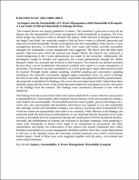| dc.description.abstract | KAKANDE ISAAC (2011-M092-20013)
An Inquiry into the Sustainability of E-Waste Management within Households in Kampala: A Case Study of Selected Households in Rubaga Division.
The research herein was largely qualitative in nature. The researcher‟s goal was to carry out an inquiry into the sustainability of E-waste management within households in Kampala. The Case Study design was chosen in order to facilitate the Inquiry. With reference to Rubaga Division as the single Case Study, the researcher sought to find out how e-waste is collected, processed and disposed of within households. Further investigations into the sustainability of the current e-waste management practices, at household level still, were made and finally, possible sustainable strategies for sustainable e-waste management were suggested. The above were the three main specific objectives upon which the research was hinged. Before the research was conducted, a scaled background to the e-waste phenomenon was made by the researcher. Additionally, the investigator sought to broaden and appreciate the e-waste phenomenon through the related literature which was accessed and reviewed in this research. The research was deemed pertinent because there was no foundational information available with regard to e-waste management in the homes. The research was also considered to be a focal point upon which other research would be inspired. Through simple random sampling, stratified sampling and convenience sampling techniques, the researcher successfully engaged eighty respondents from two zones in Rubaga Division in the study. Having interviewed thirty respondents and administered fifty questionnaires, the researcher consolidated his findings with covert and overt observation skills. Indeed these three methods, along with the review of the related literature helped the investigator to avail a discussion of the findings from the research. The findings were consistently discussed in line with the objectives.
The findings from the research did confirm that various methods of e-waste collection were present at household level. Unfortunately, these methods; like the mixture of all waste streams for instance, were found to be unsustainable. The household practices used to gather, process and dispose of e-waste were also unsustainable and immediate intervention was required. It was also established that although current and sustainable strategies were known, practicing them at household level would not realise any sustainability since there is no continuity. With reference to the findings, the researcher made the following recommendations: it was important that the separation of all waste streams at household level be emphasised through the sensitisation of all the household dwellers. Secondly, the establishment of systems and structures to facilitate continuity while gathering e-waste from households to district level ought to be streamlined by government and other stakeholders; and thirdly, the enforcement of new (and/or) the already established laws which facilitate sustainability in e-waste management should be realised. Since the e-waste phenomenon is still new to the Ugandan scene, the researcher realised numerous areas which would inspire further inquiry. Some of these areas were suggested together with the policy, environment and socio-cultural domains.
Key Words: Inquiry, Sustainability, E-Waste Management, Households, Kampala | en_US |


